DYING FROM IMPROVEMENT Inquests and Inquiries into Indigenous Deaths in Custody No matter where in Canada they occur, inquiries and inquests into the deaths of Indigenous people while in state custody often tell the same story. Repeating details of fatty livers, mental illness, alcoholic belligerence, and a mysterious incapacity to cope with modern life, the legal proceedings declare that there are no villains here, only inevitable casu-alties of Indigenous life. But what about a sixty-seven-year-old man who dies in a hospital in police custody with a large, visible, purple boot print on his chest? Or a barely conscious, alcoholic older man, dropped off by police in a dark alley on a cold Vancouver night? Or Saskatoons infamous and lethal starlight tours, whose victims were left on the outskirts of town in sub-zero temperatures? How do we account for the repeated failure to care evident in so many cases of Indigenous deaths in custody? In Dying from Improvement, Sherene H. Razack argues that, amidst systematic state violence against Indigenous people, inquiries and inquests serve to obscure the violence of ongoing settler colonialism under the guise of benevolent concern. They tell settler society that it is caring, compassionate, and engaged in improving the lives of Indigenous people even as the incarceration rate of Indigenous men and women increases and the number of those who die in custody rises. sherene h. razack is a professor in the Department of Social Justice Education at the Ontario Institute for Studies in Education, University of Toronto. razack is a professor in the Department of Social Justice Education at the Ontario Institute for Studies in Education, University of Toronto.
Dying from Improvement Inquests and Inquiries intoIndigenous Deaths in Custody SHERENE H. RAZACK UNIVERSITY OF TORONTO PRESS Toronto Buffalo London  University of Toronto Press 2015 Toronto Buffalo London www.utppublishing.com Printed in the U.S.A. ISBN 978-1-4426-3737-5 (cloth) ISBN 978-1-4426-2891-5 (paper) Printed on acid-free, 100% post-consumer recycled paper with vegetable-based inks. Library and Archives Canada Cataloguing in Publication Razack, Sherene, author Dying from improvement : inquests and inquiries into Indigenous deaths in custody / Sherene H. Razack. Includes bibliographical references and index.
University of Toronto Press 2015 Toronto Buffalo London www.utppublishing.com Printed in the U.S.A. ISBN 978-1-4426-3737-5 (cloth) ISBN 978-1-4426-2891-5 (paper) Printed on acid-free, 100% post-consumer recycled paper with vegetable-based inks. Library and Archives Canada Cataloguing in Publication Razack, Sherene, author Dying from improvement : inquests and inquiries into Indigenous deaths in custody / Sherene H. Razack. Includes bibliographical references and index.
ISBN 978-1-4426-3737-5 (bound). ISBN 978-1-4426-2891-5 (paperback) 1. Indian prisoners British Columbia Death. 2. Indian prisoners Saskatchewan Death. 3.
Coroners British Columbia. 4. Coroners Saskatchewan. 5. Discrimination in criminal justice administration British Columbia. 6.
Discrimination in criminal justice administration Saskatchewan. I. Title. E78.B9R39 2015 365'.6089970711 C2015-900940-5 University of Toronto Press acknowledges the financial assistance to its publishing program of the Canada Council for the Arts and the Ontario Arts Council, an agency of the Government of Ontario. University of Toronto Press acknowledges the financial support of the Government of Canada through the Canada Book Fund for its publishing activities. For Paul Alphonse, Frank Paul, Anthany Dawson,and all those who died in custody Contents Acknowledgments ix A Note on Names xiii Introduction.
Boot Print on the Chest: Disappearing Indians in Life and Law 3 1 The Body as Placeless: Memorializing Colonial Power 29 2 Dying from Improvement 57 3 The Body as Frontier 82 4 People Die: A Killing Indifference 112 5 The Medico-legal Alliance: Anthany Dawson and the Diagnosis of Excited Delirium 136 6 It Happened More than Once: Freezing Deaths in Saskatchewan 164 Conclusion. Tombstone Data 192 Appendix. Deaths in Custody: Saskatchewan 19952013 211 Notes 221 Works Cited 277 Index 293 Acknowledgments The research and writing of this book was an exceptionally long pro cess for me. While I would like to blame the delay on the demands of academic life, the truth is that the closer I got to the state and settlers role in Indigenous death, the more I felt unable to write about it. I am very much in debt to those who understand the violence at the heart of settler colonialism and who encouraged me to carry on trying to name it. This book is dedicated to all those who died in custody.
My debt begins with the family of Paul Alphonse and especially with Kristy Pal mantier, who was generous beyond measure. Alphonses community, including former Chief Nancy Sandy, Amy Sandy, Elder Jean Alphonse, and Kiddo Alphonse, took the time to meet with me and share their thoughts about Paul Alphonses death in custody. Nancy Dawson spoke to me candidly of her son Anthanys life and death. Peggy Clement did not hesitate to give me her support when I asked her how Frank Pauls family would feel if I wrote about his case. Saskatchewan, for many the epicentre of Indigenous deaths in custody, would not have been possible for me to begin to grasp without my late friend and colleague, Patricia Monture-Angus, to whom chapter six is dedicated. Trisha not only drove me to meet with those who could help me understand Indigenous deaths in custody, but she also inspired and supported me with her own remarkable courage and unflinching attention to colo nial violence that I could not do without and that I continue to rely on.
I wish to thank Cynthia Callison, Stephen Keliher, Cameron Ward, Laurie Wilson, and Don Worme, the legal professionals associated with some of the cases I discuss, who shared their files and their thoughts. Research assistants are really the foundation of this book. Leslie Thielen Wilson, Carmela Murdocca, Lynn Caldwell, and Gada Mahrouse, while x Acknowledgments still doctoral students, kept pushing me to write this book and were caring enough to berate me when I could not find the courage to do it for a few years. When they became professors, they continued to think about deaths in custody and sustained me with their encourage ment. More than this, however, their stellar anti-colonial scholarship has deeply enriched my own. Kate Milley took over where they left off as students and gave me the full measure of her research skills, com passion, and insight into colonial violence, as well as years of experience working with marginalized groups.
I am particularly grateful to Kate for continuing to remind me, even as the book went to press, that I track not only Indigenous death but Indigenous resistance. Shaista Patel, Nashwa Salem, and Louise Tam gave unsparingly of their intel lectual gifts. They, along with virtually every graduate student whose path crossed mine at the Ontario Institute for Studies in Education of the University of Toronto, contributed research, ideas, and an abiding commitment to anti-colonial work. I am forever grateful. No book like this sees the light of day without plenty of dress rehearsals. I have often felt uneasy giving lectures on the research, hazarding analyses that were too preliminary, forgetting to think about the pain I cause in speaking of this violence, and sometimes speaking too con fidently about something I could only sense.
The scholars of the West Coast and the Prairies at Simon Fraser University, the University of British Columbia (UBC), UBC Okanagan, Mount Royal College, and the University of Saskatchewan have all been gracious and insight ful. I owe special thanks to Jiji Voronka, Rod Michalco, and Tanya Titchkosky, who helped me explore the parallels between colonialism and the oppression of people with disabilities. I thank friends and colleagues who read drafts, offered help, and enriched this work with their own, among them Brenna Bhandar, Mark Harris, Jon Goldberg Hillier, Tasha Hubbard, Donna Jeffery, Carmela Murdocca, Honor Ford Smith, Bonita Lawrence, Sarah Keenan, Suvendrini Perera, Joseph Pugliese, Denise Ferreira da Silva, and Nadera Shalhoub Kevorkian. At the end of the writing during time I spent on a fellowship at Curtin University, Suvendis intellectual gifts, including her work on racial and colonial violence, and her friendship gave me the last push I needed to bring the book into the light of day. My thanks to the three anonymous review-ers and to Doug Hildebrand and the team at the University of Toronto Press for their support and for the care they gave this manuscript. Caro-lyn Zapf was a remarkable copy editor, and she improved this work immeasurably.
Next page
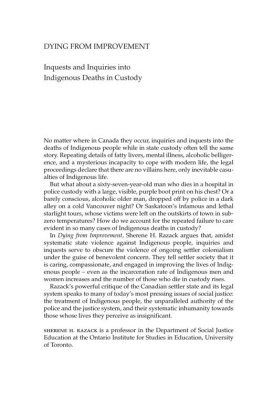

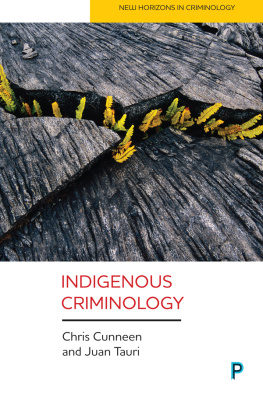

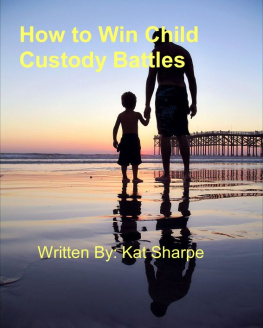
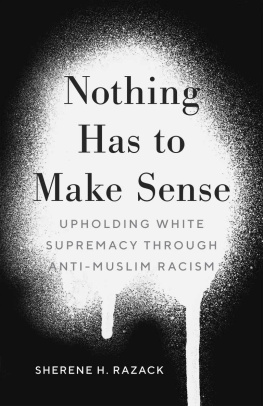
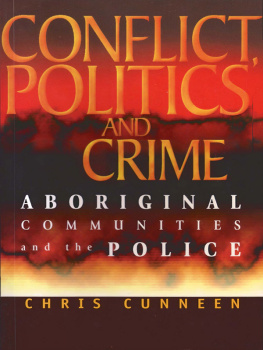
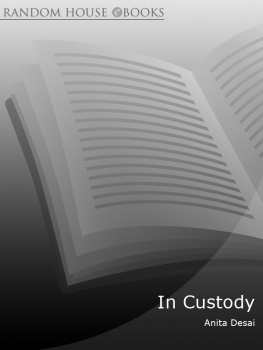
 University of Toronto Press 2015 Toronto Buffalo London www.utppublishing.com Printed in the U.S.A. ISBN 978-1-4426-3737-5 (cloth) ISBN 978-1-4426-2891-5 (paper) Printed on acid-free, 100% post-consumer recycled paper with vegetable-based inks. Library and Archives Canada Cataloguing in Publication Razack, Sherene, author Dying from improvement : inquests and inquiries into Indigenous deaths in custody / Sherene H. Razack. Includes bibliographical references and index.
University of Toronto Press 2015 Toronto Buffalo London www.utppublishing.com Printed in the U.S.A. ISBN 978-1-4426-3737-5 (cloth) ISBN 978-1-4426-2891-5 (paper) Printed on acid-free, 100% post-consumer recycled paper with vegetable-based inks. Library and Archives Canada Cataloguing in Publication Razack, Sherene, author Dying from improvement : inquests and inquiries into Indigenous deaths in custody / Sherene H. Razack. Includes bibliographical references and index.